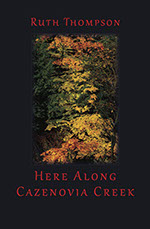Ruth Thompson’s vivid cycle of the seasons – with its rich enumerations, its animated landscapes, its effusive witness – belongs to the world of Gerard Manley Hopkins’ sacramental poems. But where Hopkins finds nature one vast evidence of God’s presence, Ruth Thompson’s secular vision employs the myth of Persephone – wintering underground, reborn in spring – to give mere experience meaning. And yet hers is no common, garden variety Persephone. In the cycle’s shattering last lines (“And we are home. / But we are never kin.”), the newborn Persephone refuses her birthright and declares her alienation and becomes a disaffiliated spirit hovering over the world she has so lovingly brought to life.
- Irving Feldman, author of Collected Poems, 1954-2004
Here is a poetry buoyant and wise, expert in observation, celebrating the natural world with imagination, celebration, and illumination. Ruth Thompson’s poetic ancestors are Whitman and Williams and Oliver, yet she has reached into her own distinction as “the chickadees” who “peck through, discard,/picky as women squeezing fruit.” I love these poems for their being at once earthy and full of spirit and mystery. Like the best poems, they make me “greedy of eyeball” like “pigs scuffling in this gorgeous swill!” Yes.
- Philip Terman, author of Rabbis of the Air
ISBN 978-0-983307204
2011, 2017
$10 (Kindle $2.99)

Here Along Cazenovia Creek
